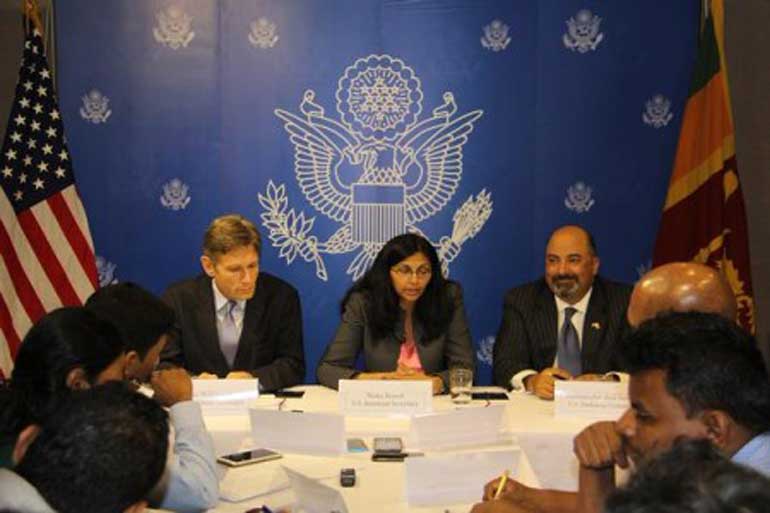Tuesday Feb 17, 2026
Tuesday Feb 17, 2026
Thursday, 27 August 2015 00:00 - - {{hitsCtrl.values.hits}}

By Dharisha Bastians
Sri Lanka looked set to escape a minefield of international action on war crimes allegations with a US Government announcement yesterday that it would sponsor a resolution at the UN Human Rights Council in Geneva next month supporting the Government’s plans for a domestic investigation and reconciliation.
The announcement marks a departure from the previous US position that allegations about atrocities committed in Sri Lanka at the end of the war had to be probed internationally in the absence or failure of domestic processes.
US Assistant Secretary of State for Central and South Asian Affairs Nisha Biswal told reporters at the American Centre yesterday that the US government had decided to offer a resolution at the September session of the UNHRC.
“We have also expressed our hope that it will be a resolution of collaboration working with the Government of Sri Lanka and other key stake holders,» Assistant Secretary Biswal said, hinting at a consensus resolution that could be adopted without a vote at the Council. Washington has sponsored increasingly strident resolutions at the UNHRC for three years calling on the Sri Lankan Government to investigate allegations of major rights abuses committed during the last stages of the war. In March 2014 Washington was the main sponsor of a resolution that established a special UN investigation into the allegations.
But yesterday, in an apparently reversal of this position, the US Assistant Secretary also expressed her Government’s fundamental belief that a domestic investigation into the allegations of abuse would render a more “durable outcome.”
“We fundamentally support efforts to create a credible domestic process for accountability and reconciliation,” Biswal noted.
On Tuesday, Foreign Minister Mangala Samaraweera said he had briefed the visiting US officials about the framework of the domestic mechanism to address accountability issues outstanding since the end of the war.
The UN report is due out during the UNHRC September session, but Biswal said the US had yet to see the document. The Sri Lanka resolution in September would also reflect the findings and recommendations of that report by the Office of the High Commissioner for Human Rights (OHCHR), she said.
Biswal said her Government recognized the different landscape and opportunity to advance reconciliation and accountability in the island.
Biswal and her delegation, including Assistant Secretary of State for Democracy, Human Rights and Labour, Tom Malinowski, were the first foreign dignitaries to arrive in Sri Lanka for high level talks since the 17 August parliamentary election. Both US diplomats heaped praise on the new Government’s efforts to foster reconciliation in a marked departure from strong diplomatic language used to criticise Sri Lanka’s lack of progress on accountability post-war in previous visits by US officials.
Relations between Colombo and Washington grew increasingly strained during the tenure of President Rajapaksa, who consistently resisted international pressure to probe war crimes allegations and seek reconciliation with the Tamil community.
Both top US diplomats expressed confidence in the new Government’s approach to engage with the international community on issues of human rights and reconciliation.
“There is an opportunity now that did not exist in the past, to work on this collaboratively,” Assistant Secretary Malinowski said, hinting at improved diplomatic engagement with Sri Lanka’s new administration.
Malinowski said the new Government’s approach to difficult human rights concern has been to defend the country’s interests without being defensive.
“The Government has reached out, it has listened, it has engaged in dialogue with everybody. It has acknowledged the need of truth-telling and accountability. In doing that it has won a tremendous amount of trust and confidence,” Malinowski told reporters.
Malinowski said trust in the new Government was encouraging the international community to give Sri Lanka the time and space it requires to deal with “difficult issues” of its painful past.
The Assistant Secretary for Human Rights cautioned however that the Sri Lankan Government would be judged based on actions and not promises.
Both officials who also met with representatives of the Tamil National Alliance last morning acknowledged that the Government would have to build trust and confidence in the domestic process to investigate the alleged violations in war time, since domestic mechanisms had consistently failed or failed to take off.
“The failures of the past are very much on our minds,” Malinowski said, “which is why there is an emphasis on trust-building.”
He said the US and the International Community would not walk away from the Sri Lankan issue in September, whatever the thrust of the new resolution.
“International attention will continue,” Malinowski said.
Assistant Secretaries Biswal and Malinowski held talks with President Maithripala Sirisena, newly-elected Prime Minister Ranil Wickremesinghe and leaders of the Tamil National Alliance, the main Tamil party during the visit.